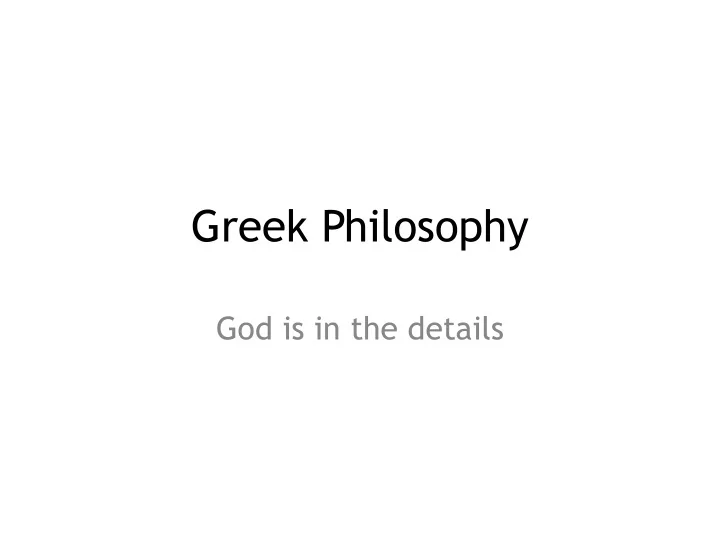

Greek Philosophy God is in the details
1. Context and background • Demonstrate that you understand where and why Plato’s Theory of Forms and Cave Allegory were written. • Socrates is the protagonist of Plato’s Republic within which he is arguing about how to establish a perfect state . In this dialogue he reveals the Theory of Forms .
2. It’s a theory of knowledge Plato is presenting a • theory of knowledge. “True knowledge lies in knowing that you know nothing .” Episteme comes from • reason. Doxa comes from experience . • It is only those who spend their lives in pursuit of truth as philosophers can be trusted to have any knowledge at all.
3. The Tripartite of the Soul The state should reflect a • person's psyche: Guardians, Auxiliaries and Workers. The psyche is divided into • three traits. People in each class excel in one specific trait. – Reason (gold located in the head) – Guardians rule. – Spirit (silver located in the breast) –– Auxiliaries fight. – Passions (bronze located in the abdomen) – Workers work.
4. The Allegory of the Cave • The Allegory of the Cave reflects Plato’s perception of the world and how we pursue knowledge. • Free prisoner – Philosophers who see the truth. He is dragged up the steep and rugged ascent. • Puppeteers – Those who maintain the status quo within Athens. • Prisoners – All people in the world. • Puppets – The Forms of things we experience. • Shadows – All things we sense experience. • Wall – The world in which we live. • The Sun – The Essential Form of Goodness.
5. The Theory of Forms The Forms are the true • ideas that we recognise. The FORMS are real. They • exist in the World of Forms . After death our souls • transmigrate to a new body. In the World of FORMS we • interact with the FORMS. When alive, we recognise • the FORMS that we experience through our reason.
6. Plato’s defence • Plato’s theory cannot be refuted. Arguing it makes little sense is admitting we can’t know the FORMS. • The FORMS cannot be properly known by us. They have their own natures which can only be known properly a- temporally – by the gods etc.
7. The nature of the FORMS • The Essential Form of Goodness gives life to the other FORMS. • The EFG is, like the sun, the source of the life of the FORMS, it is what allows us to know them. It is the light switch for the FORMS. The FORMS are ideas which transcend space and time and do not change. They are constant and they are what is known. The fool sees trees, the philosopher sees examples of the true FORM of tree.
8. The Influences of Plato – Heraclitus All things are changing. “You cannot step in the same river twice.” Temperature is a constant flux between the two extremes of hot and cold. Measurement is the flux between long and short etc. It is the Logos that keeps them from surpassing one or the other. Everything is made of Fire as it is always changing from one form to another.
8. Influences of Plato – Parmenides All things are fixed. If you take any snapshot you see that things are not moving at all. The arrow in mid-flight is not moving at all. All temperature is a variation of one thing. The Block Universe: everything that can happen is set. This is fatalism or determinism.
8. Influences of Plato – Pythagoras Belief in mysticism and reincarnation. The universal certainty of mathematical ideas.
8. Influences of Plato – Socrates True knowledge comes from knowing you know nothing. Socrates was put to death by the Athenian government for corrupting the youth. He alone was in possession of true knowledge and was killed for it.
9. Third Man Fallacy • For every FORM there must be an endless regression of FORMS making it meaningless. • If you take a man and compare him to another man, you see the similarity because they share a kinship in the group: man. This group is represented by a FORM of man. But that FORM itself belongs to the group: man. The kinship between the FORM of man and the men can itself be seen to belong to a group: man which must again be represented by another FORM of man, a third MAN. And so on.
10. One theory against another • Plato’s theory of knowledge relies on reason, Aristotle’s on experience. • Aristotle argues that all things are made of a matter and into a form by an efficient agent, so that they can fulfil their final cause . This methodical approach has lent itself to developments in science, technology and medicine. It is a working model using what we can experience.
Recommend
More recommend